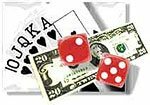Thursday, September 21, 2006
Slots of states near Pa. addicted to gambling
 In less than a week, Pennsylvania regulators will give six racetracks across the state licenses to run slot machine parlors.
In less than a week, Pennsylvania regulators will give six racetracks across the state licenses to run slot machine parlors.But in the months it may take those slots parlors to open, states bordering Pennsylvania will be playing a different kind of game - one-upsmanship.
And that extra pressure - plus a secret state report predicting less than anticipated revenues from Pennsylvania's slots parlors - may hasten the call for turning the new racinos into full fledged casinos.
New Jersey lawmakers are already considering adding video lottery terminals and possibly slot machine to shore up its horse tracks, even though casinos in Atlantic City already susbsidize the industry with nearly $30 million a year, the Asbury Park Press reported today.
"It is time we get (slot machines) at the Meadowlands," said Assemblywoman Jennifer Beck, R-Monmouth. "We know purses are in jeopardy. We know breeders are moving out of state."
The racing industry in New York is even worse shape, needing a $30 million state bailout to stave off bankruptcy at its three racetracks until their video slot machines are up and running, USAToday reported this week.
In Delaware, state officials cited Harrah's development of a $500 million-plus racino in Chester, Pa., as their reason for lowering revenue estimates from lottery and slots gambling next year by $5 million.
"Anything new is going to get a lot of play," said Richard Cordrey, finance secretary the Delaware Economic and Financial Advisory Council.
In response to the increased competition, Delaware's racinos aren't scaling back - they're expanding. Dover Downs filed plans this month with the city's planning commission to add more space for slot machines, restaurants and offices.
West Virginia is taking it a step further.
The state racing association released a poll Wednesday showing that a majority of residents support county referendums on legalizing table gambles at that state's four racetracks next year.
Moves to expand gambling among that state's part-time Legislature have failed twice in the last two years, so now supporters want to let the public decide, according to today's West Virginia Gazette.
State budget estimates are that competition will drop racetrack video lottery revenues by about 8 percent this budget year, or more than $30 million, and by 15 percent, or more than $62 million, in 2007-08.
Racing association president John Cavacini said he believes table games would generate enough new business to at least offset those losses.
When the West Virginia Legislature convenes in January, he said, three to four racetracks will have competing video slots in operation, with additional facilities, including three freestanding casinos, ready to come online.
Pennsylvania voters never got a chance to decide whether they wanted slot machine gambling. Instead, the Legislature approved a bill legalizing up to 14 slots parlors in the middle of the night during the July 4 holiday weekend in 2004.
Now, we're learning that the very purpose of legalizing them - to gain $1 billion in extra revenue with which to lower school property taxes statewide - may not generate nearly that much, according to excerpts of a private auditing report Gov. Ed Rendell and the Pennsylvania Gaming Control Board refuse to disclose.
So, all of this is being done to give homeowners a $200 annual tax break, even though many school districts raised their property taxes by more than that this year.
I'm already on record as predicting the Legislature - once again, not voters - will be asked to add table games to the racinos here within three years.
After all, gambling interests are spending millions of dollars lobbying our lawmakers and are still secretly contributing millions more to their political campaigns.
Yet no one has answered this basic question: If it's bad when individuals are addicted to gambling and rely on their winnings to make ends meet, why is it better for state governments to get hooked on it?

This Week's Rants | The Daily Rant Archives

The Daily Rant by Dave Ralis is licensed under a Creative Commons Attribution 3.0 United States License.

The Daily Rant by Dave Ralis is licensed under a Creative Commons Attribution 3.0 United States License.


